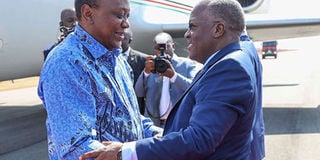Border spat should not affect citizens

Tanzania President John Magufuli (right) receives Kenya's President Uhuru Kenyatta in Chato Town, Tanzania, on July 5, 2019. PHOTO | PSCU
What you need to know:
- Tanzania gets electrical equipment, plastics, iron and steel. We have always been siblings who depend on each other for survival, despite the hiccups.
- We have enough battles to fight, such as the coronavirus, and we don’t need our leaders to add attacks from neighbouring communities to our list of troubles.
The East African response to Covid-19 has been interesting to watch.
President Uhuru Kenyatta seems focused on flattening our curve while Tanzania’s John Pombe Magufuli is determined to keep his economy going.
This difference in strategy has put Tanzania and Kenya at loggerheads. Now what the citizens of both countries thought was a small misunderstanding has turned into a full-blown wrangle as Kenya locks down its borders with Tanzania, while Tanzania forbids Kenyan goods from being delivered to Tanzania as a destination point.
This isn’t the first time the two governments are squabbling. In 1974, Kenya and Tanzania locked down their borders because of economic competition; Tanzania wanted their Dar es Salaam port to also have a share in the Zambian trade.
Again after the 1977 East Africa Community break-up, the two nations did not see eye to eye, with Kenya being accused of appropriating most of the EAC’s properties.
TRADE
Despite these wrangles, citizens of both countries have always shared a cordial relationship. Kenya is the leading market for Tanzania’s goods, getting thousands of tonnes of maize from there, along with other food items such as beans, onions and oranges, while exporting goods of substantial amounts to Tanzania.
Tanzania gets electrical equipment, plastics, iron and steel. We have always been siblings who depend on each other for survival, despite the hiccups.
Moreover, as all border communities attest, the two countries don’t just trade with each other; they also marry amongst each other.
This is evident in the way people living near the Kenya-Tanzania border call each other “shemeji”, because of the kinship ties that come with this intermarriage.
So even as the two current leaders go at each other’s throats, just as their predecessors did, it is our hope that their squabbles will not affect us.
They may have government-level problems to iron out, but for us citizens, the people across the border are not just our neighbours, they are our trade partners and kinsmen.
SOCIAL RELATIONS
We all want the same thing: a healthy community despite the Covid-19 pandemic, and a flourishing economy on both sides, since our economic fate is intertwined.
We thus hope that as the two bulls fight over whose coronavirus strategy is best, they will ensure that we the people are not affected; that as they size each other up, they will not be the leaders who sour our relationship with our kinsmen and trade partners.
They may have their own scores to settle with each other, but we citizens don’t.
We have enough battles to fight, such as the coronavirus and the occasional floods, and we don’t need our leaders to add attacks from neighbouring communities to our list of troubles.
Let them leave us and our interests out of it. After all, our success as neighbours is intertwined.
The author comments on topical issues; [email protected]





